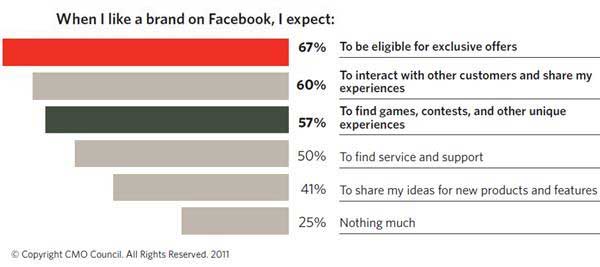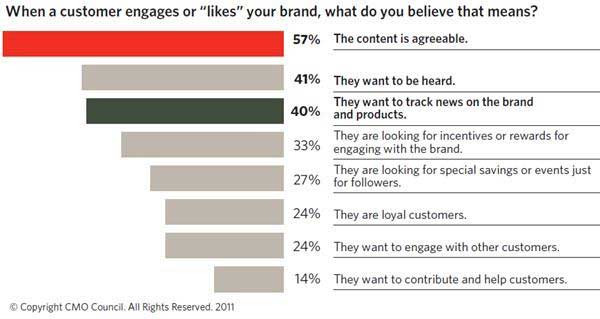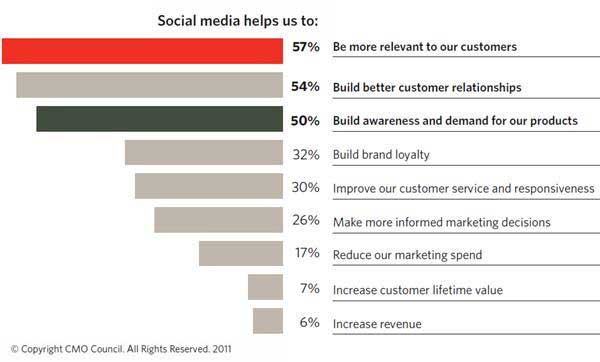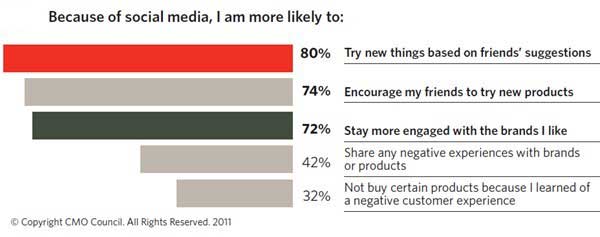There appears to be a disconnect between what marketers think consumers want from social media and what consumers actually want: Most senior marketers say consumers "want to be heard," but consumers say they want exclusive offers in exchange for interaction, according to a report by the CMO Council.
When they commit to "liking" a brand on Facebook, more than two-thirds of consumers (67%) expect to be eligible for exclusive offers; 60% want to interact with other consumers and compare experiences; and 57% want to find games and contests.

Some consumers do want to be heard: 41% say they commit to liking a brand on Facebook to share ideas for new products and features; 50% expect to find service and support from their social networking site.
Below, other findings from the Chief Marketing Officer (CMO) Council's new "Variance in the Social Brand Experience" study.
However, marketers view social engagement as more of a by-product of good content, and they appear less concerned with encouraging loyalty among fans and followers.
Among those surveyed, the top reason consumers interact with brands is because of good branded-content (57%), followed by a desire to be heard (41%) and interest in finding news or information about products (40%).

One one-third (33%) of senior marketers say their fans are looking for incentives or rewards, and 27% believe customers are seeking special savings or experiences exclusive for followers.
Other key findings among senior marketers:
- 22% say they reward users who "like" or "follow" their brand with special offers or deals.
- 52% say their brands have enjoyed greater influence because of their presence on social networking sites, but only 16% believe their brand has excellent or very good influence.
- 17% say social media is fully meshed, aligned, and integrated into the overall marketing mix.
- 80% say social media marketing has moved up on their priority list in the previous 12 months.
Social Media Positively Affects Marketing Operations
Nearly one-half of senior marketers (47%) say social media has increased the complexity of marketing planning and mix allocation. Even so, more than one-half credit social media with improved customer listening, engagement, and conversations (55%), as well as opening new avenues for gathering market insights (55%).
In addition, 20% say social media has introduced new efficiencies and effectiveness to go-to-market strategies.
Social Presence Increases Relevance of Brands
Marketers find value in social media because they believe it helps them become more relevant to customers (57%), build better relationships (54%), and promote awareness and demand for products (49%).

Fewer marketers cite hard metrics such as revenue gains (6%) or increases in customer lifetime value (7%).
Social media customer communication is still low: The top method of direct communication from customer to company takes place via email (76%) or customer service lines and call centers (54%); only 11% of senior marketers cite Facebook pages, and 8% cite Twitter.
Consumers Share Experiences via Social Media
When they do use social media, consumers appear to inspire each other to engage with brands:
- 80% say they are more likely to engage with a brand based on a friend's suggestion.
- 74% say they are likely to encourage friends to try new products.
- 72% say they are more likely to stay engaged with their favorite brands.

Some 42% of consumers use social media to share negative experiences with brands and products, likely influencing the 32% who decide not to buy a product based on that negative feedback.
Consumer Communications
Online channels dominate consumer communication: 65% of consumers say they communicate with brands via email, 50% fill out a form on the company website; those channels far outweigh others like visiting a retail location (25%), sending an SMS text (12%), or attending a brand event (6%).
Most consumers (47%) hold fairly reasonable expectations of having their customer support issues addressed within 24 hours. However, a combined 41% expect issues to be addressed either immediately (22%) or within one hour (19%).
About the data: Findings from the CMO Council study are based on two separate surveys, among 132 senior marketers and 1,300 adult US consumers, both conducted Sept to Nov 2011 in partnership with Lithium.



